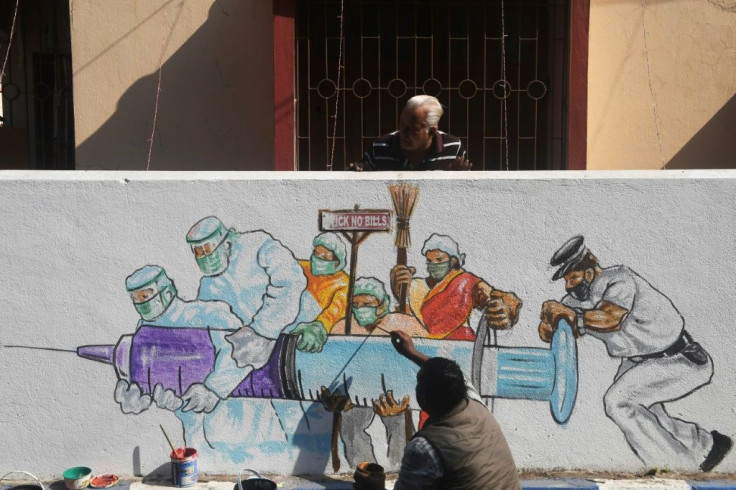'Pharmacy Of The World' India Starts Massive COVID-19 Vaccine Rollout
KEY POINTS
- India has approved two Covid-19 vaccines for restricted emergency use - Covishield and Covaxin
- Authorities are planning to see 300 million high-risk people inoculated over the next six to eight months
- For the vaccination drive, India has prepared 2,360 master trainers, 61,000 program managers, 2 lakh vaccinators and 3.7 lakh other personnel.
India has kickstarted the first stage of the roll-out of Covid-19 vaccines, in a drive billed the "world's largest inoculation program."
On Tuesday, the Serum Institute of India (SII), manufacturer of Oxford University's Covishield, shipped out its first consignment from Pune to other parts of India, including Telangana, Hyderabad, Delhi and Kolkata.
India's Civil Aviation Minister Hardeep Singh Puri said four airlines operated nine flights to transport 5.65 million doses of vaccine from Pune to 13 cities across the country, reported NDTV.
In the vaccination drive set to start on Jan. 16, authorities are planning to see 300 million high-risk people inoculated over the next six to eight months, including 30 million frontline workers. As many as 270 million older-than-50 or deemed high-risk people will also get the vaccine.
According to the country's Health Ministry, 11 million doses of Covishield are being procured at $2.73 per dose.
This is besides another 5.5 million doses of Covaxin, manufactured by Bharat Biotech, procured by the government.
Adar Poonawalla, CEO, Serum Institute of India, said they will be selling 100 million doses of Covishield at ₹200 ($2.73) per dose as per government request.
"We have given a special price of ₹200 for the first 100 million doses only to the Government of India on their request that we want to support the common man, vulnerable, poor and healthcare workers. After that, we'll be selling it at ₹1,000 in private markets," Poonawalla added.
According to Poonawalla, SII produced 40 million doses before the vaccine's phase three results were known. "It will have 100 million doses by next month and up to 400 million by April. It was a calculated risk, I would put it that way. We did commit early without having a lot of data and information," Poonawalla told ABC News.
The Serum Institute of India, founded over 50 years ago, is the world’s largest manufacturer of vaccines by volume.
Meanwhile, Bharat Biotech charges ₹295 ($4.03) per dose. The company, which has partnered with the Indian Council of Medical Research for the vaccine, will give 1.65 million doses to the center free of cost.
For the vaccination drive, India has prepared 2,360 master trainers, 61,000 program managers, 2 lakh vaccinators and 3.7 lakh other personnel. The country also held two mock drills in its 736 districts, to review preparedness on the ground. It has also developed the Co-Win digital platform to track vaccine recipients and ensure a timely second dosage.
India runs a massive immunization program and is home to half a dozen major manufacturers. It accounts for about 60 percent of the world's vaccine supplies, earning a reputation as the "pharmacy of the world." It also boasts of the 42-year-old immunization program, one of the world's largest health programs.
Equipped with a well-oiled electronic system to stock and track these vaccines, India's 55 million people -- mainly newborns and pregnant women -- receive some 390 million free doses of vaccines every year.
India's drive comes amidst Oxfam's warning that rich countries, representing just 13 percent of the world’s population, have already cornered more than half of the vaccines.
On Tuesday, India recorded 12,584 new coronavirus cases, the lowest in seven months. The national COVID-19 recovery rate stands at 96.49 percent.

© Copyright IBTimes 2025. All rights reserved.





















